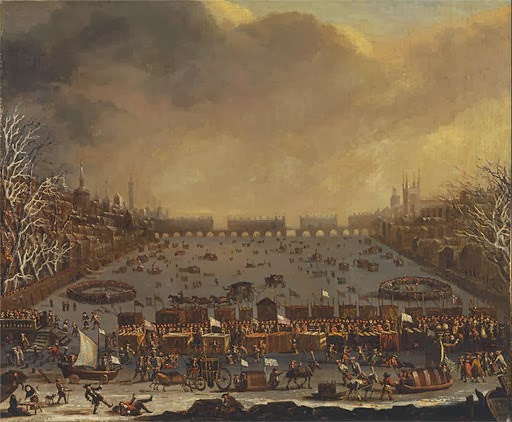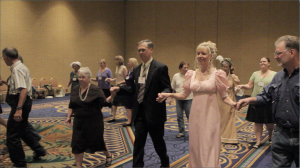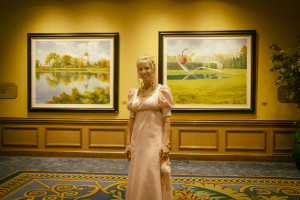“Miss Virginia!” The dubious butler called – nay bellowed – her name.
Virginia Mortimer jumped at the stentorian tones. She’d asked for the summons, but it hadn’t been necessary. It seemed she’d hardly slept at all. She’d been up and dressed for the last hour.
She took a last glance around the plush bedroom. How elegant it had seemed the night she arrived. In the light of what had transpired over the last few weeks, it looked tawdry now – faded and dusty in the dawn light now shafting through the windows.
The hackney must be here to take her to the posting inn. To ride a public stagecoach home to Primrose Hall would serve as only the latest indignity of her headlong fall from grace
On the floor, half under the bedside table, the corner of a book caught her eye. She reached for it, not wanting to leave a trace of herself behind. It was a slim leather-bound book, given to her by her parents. Stamped in gold letters on the front was the word ‘Psalter’. She jammed it into her capacious reticule.
Only then did she turn to the door, square her shoulders and respond to the odious butler. “I’m coming!”
The cad who’d brought her to this nadir was nowhere to be seen. She didn’t care to say ‘good bye’ and her departure wouldn’t matter to him when he stumbled in from another night of carousing.
The butler eyed her valise, but made no move to assist, but simply opened the door. No pretense of respect, he closed the door as she humped her own valise down the scrubbed white steps. She rummaged in her reticule, and handed a note to the driver before hiking her skirts and launching herself awkwardly into the hackney. The hackney gave a lurch, and she was on her way home. Back to the small village of Beckston to face her parents’ recriminations and her future as a ruined maiden.
Though the day was sunny, a high wind blew swirls of gray smoke down into the dusty inn yard where she waited, clutching her cloak about her and hoping her large bonnet hid her face. She wondered what the chances were that someone of her village would be making this same journey.
When the coach arrived, she was the first passenger to board. One by one, others entered the coach. She held her breath as each passenger mounted, letting it out when she recognized no familiar face. What would the grim-faced soldier, the plain lady in the depressing bonnet, or the elderly clergyman think of her if they knew what she really was, and that she was slinking home in shame?
Only two months ago, when she slipped out during the night, she’d left her childhood behind, naively thinking she knew better than her parents. She’d believed Lord Beckwith’s son Randall loved her and would do right by her, no matter what her mother and father said to the contrary.
Virginia had noticed Randall for the first time at the Beckwith’s annual picnic at their country estate outside Beckston. He must have been down from Cambridge. The local gentry were invited for the day, which began with competitive games on the lawn for entire community, followed by a picnic. The gentry then joined houseguests and the noble lords of the manor for an evening dinner and ball inside, while the common folk reveled on outdoors.
Invited with her family to the dinner and ball, she enjoyed the lavish surroundings, and never expected to draw Randall’s attention. From the moment he’d lofted a crumpled note at her she’d been hooked. A note which landed down the front of her bodice. She fished it out, read the words ‘You’re beautiful’ and looked up in surprise to lock eyes with the impossibly handsome young man.
His wavy blond hair, chiseled straight nose, teal-blue eyes and muscular physique caught all the young girls’ fancy, and when he kept paying her, a mere barrister’s daughter, particular attention, she was sunk.
As the coach rumbled out of the London inn yard, Virginia’s mind shied away from continuing this inward litany of her fall, and instead thought ahead to her arrival home. Her parents’ quick response of ‘yes’ to her note requesting them to allow her to come home came as a relief since she had only a few coins and nowhere else to go. Beyond that, she didn’t know what to expect of her homecoming.
***
Hours later, her mother sailed toward her with open arms. “Darling, you’re home!” Hugs, pats on the back, and murmurs of welcome caused the tears to flow. Virginia vowed right then and there never to disregard her parents’ wishes again. They had tried to tell her what was best, but she had defied them for Randall and his false promises.
She drew away from her mother’s embrace and girded herself to look her parents in the eye. “Mother – Father, how can I thank you? I am so sorry. How could I have been so blind, so foolish?” Fresh gales of tears followed.
“We forgive you, Virginia.” Her father’s gentle tone only served to make her feel more quilty. “Here, you must be chilled to the bone. Put this on.” Her father moved around behind her and laid a fur-lined robe across her shoulders. “A little homecoming gift.”
How forgiving they were. In fact, they acted as if nothing had changed and Virginia’s flight of passion hadn’t ever occurred. Mother led her to her old room upstairs, and Father trailed behind with her valise.
A dreamlike state swept over Virginia – how unreal to be back in her frilly, maidenly girlhood bedroom with its narrow bed, after the shameful deeds she’d done. Defying, sneaking away, rebelling outright and allowing herself to be deceived by a seducer.
“Put your things away, dear, and then come down for supper. We have a surprise for you.”
Virginia used the pretty china pitcher and bowl on the washstand to freshen up after the dusty travel. She’d left in London the lavish wardrobe Randall gave her. But here were all the dresses she left behind, hanging in the white-painted wooden wardrobe. How soft, simple, and demure the pale-colored muslin dresses appeared. Do I even have the right to dress as a maiden?
She had no one to hold responsible but herself. Taught from childhood to be pure, Virginia threw that teaching to the wind on the basis of a few kisses and compelling whispered words, and then allowed young love’s passion to take control. Yes, Randall was the instigator, but she alone chose sin, her own conscience told her that.
She picked a pink and white dress with a silk ribbon sash, and shimmied it over her head. Her parents must have dismissed her maid when she left, and she had to shift for herself, for now at least. She stood in front of the mirror, tying the sash into a bow, then turning it to the back. The high-waisted dress was almost too flattering to her young figure. She didn’t deserve to look so young and pretty anymore.
She sat down at the dressing table and picked up her silver-backed brush, scraping her long, glossy brown hair back into a tight chignon, wishing she could bind her sinful past as easily. But the relentless door to the future stood open, and she had to walk through.
***
“You look charming, my dear girl.” Virginia’s father pulled a chair out for her to sit at the intimate family table.
“Yes, not a day older than when you left.” Mrs. Mortimer beamed upon her daughter.
“Dear, don’t talk about that yet, let Virgie have her favorite dinner first.” He lifted the cover off a roast of beef, surrounded by potatoes and vegetables and a ring of parsley clusters.
“You’re too good to me. I don’t deserve this.” Virginia lifted her index finger to wipe away a tear.
“Remember, God’s love never fails. And we want to be like Him. Love covers a multitude of sins. His love and ours.” Mr. Mortimer laid his hand on her shoulder.
“Now let’s pray.” He bowed his head. “Dear Father in Heaven, thank you for bringing our daughter home. Thank you for this food, In Jesus Name, Amen. There, now we can eat.”
***
“But Father, we can’t have a party. A celebration for my return? How will I face the neighborhood?” They’d moved across the hall after dinner to the drawing room, where a fire crackled in the hearth.
“As far as anyone here knows, you’ve been visiting an elderly relative in the north. I felt the Lord would forgive a bit of dissembling to protect your name, unsullied, as it were.”
“Yes, we are just so grateful you are back, and none’s the wiser. We’ll just go on as before.” Mrs. Mortimer’s smile became tremulous.
“And, before you ask, we heard Beckwith’s son was given an ultimatum to join the army, else be shipped off to the West Indies to manage a plantation. He got into a duel in London and won’t be back here. He’s probably landed on the continent by now. As a younger son, he won’t be needed, either. The eldest two all have well-established nurseries. But enough about that family.”
“Now let’s have a song, Virgie.”
She took her Psalter over to the piano and started riffling through the pages. Settling on one, she began to sing and accompany herself to Psalm 68. “This one reminds me of me.”
“God frees the captive and He sends
The blessedness of home and friends,
And only those in darkness stay
Who will not trust Him and obey.”
She hung her head a moment, then straightened her spine, and turned toward her parents. “Mother, Father, I want to make very clear that I am repentant and have submitted my life to Christ now. I know it’s belated, and you always wanted me to have the Faith. Now I do. It took my fall into the miry pit to bring me to my senses and to throw myself on God’s mercy.”
“We forgive you, don’t we Tansy?” Overjoyed, with tears spilling, Mr. Mortimer looked to his wife.
Mrs. Mortimer’s face lit up, wet with tears of joy, and she responded likewise. “Yes, Harold, we both forgive. Now let it go, dear Virginia. God forgives you too, and you need to move on with your life.”
“I was such a fool to believe Randall. He told me we’d be married, so it didn’t matter because we were in love, and that God knew we were sincere. He never intended to wed me. In fact, he ended laughing in my face, and told me to find my own way home.”
“Such a base seducer will always say anything to achieve his wicked will. Most rakes at least keep hands off well-born maidens. So sorry you had to learn such a hard lesson.” Mrs. Mortimer rose and put her arm around Virginia’s shoulders. “Now come over to the sofa, and let’s plan the party. All our friends will want to celebrate your homecoming with us.
***
Long, quiet days of healing commenced. Virginia helped around the house, doing little chores like peeling apples, mending linens, knitting socks, and helping plan the party her parents insisted on.
Dread flickered in her mid-section every time she thought ahead to the celebration, but she steeled her nerves, not wishing to disappoint her parents. They seemed so hopeful everything could return to how it had been before her disgrace.
Even though her parents thought nobody knew of her shameful fall from grace, Virginia braced herself each time someone came to the house or she ran into someone in the village. What if . . . someone knew something, and spread gossip? She’d hate that, but worse, hate the taint that would fall on her family.
The day of the party arrived. She could put off her preparations no longer. Up she went, to her boudoir, where her maid fussed around, waiting to work her magic.
“Lizzy, I’m so glad you were able to come back to work. I wasn’t gone long, but you could have easily been hired on somewhere else.”
“Miss, glad I am to be back here,” her young tidy maid said with a grin. “The only job on offer whilst ye were gone was at the fishmongers, cleaning fish.”
“Well then, let’s do my hair, and get me dressed. I’ve picked out that ivory taffeta, trimmed in coral.”
Lizzy’s deft hands created a stylish psyche knot. Virginia approved, tilting her head this way, and that. “I love this style. I should have tried it sooner.” Maybe this party wouldn’t be a disaster. Her heart began to hope.
She stepped into the dress, and the maid fastened it. High waisted, it flattered her figure and whispered when she walked. A filmy fichu of ivory silk filled in the too-low neckline. Styles of the day tended toward the immodest, but Virginia was done with that. The coral cameo necklace her mother brought in earlier that evening complemented her coloring.
*
“There you are!” Her mother scurried over and grasped Virginia’s elbow as she entered the drawing room where the guests had begun to gather. “You must meet the Ashleighs, from rural Beckston. They are twins, just your age.” Mrs. Mortimer towed her across the room.
Dread of facing the guests took the form of a rock in Virginia’s stomach. But she had no choice, the party had commenced whether she was ready or not.
“Mr. Quentin Ashleigh, Miss Annabelle Ashleigh, this is my daughter Virginia. She has just returned from a lengthy trip visiting relatives.” Mrs. Mortimer performed the introductions then turned and flitted off to greet more new arrivals. Virginia caught a glimpse of her mother’s crossed fingers.
Virginia made small talk with the Ashleigh twins. He had intelligent brown eyes and curly russet hair, and his sister though not identical, had similar coloring. Virginia relaxed and the rock of dread melted away under the bright beam of the twins’ sparkling personalities.
“Miss Mortimer, your mother is a darling, she invited us for tonight when she heard we were newly settled in Beckston.” Annabelle’s curls jiggled along with her words.
“She is a sweet lady, if a daughter’s opinion counts.” Virginia replied, smiling. “Where in rural Beckston do you reside?”
“We just moved to Fairbrook Manor – just a mile or so east of here – my family’s owned it for decades. My sister and I had our fill of London for the time.”
“Yes, I’m somewhat familiar with Fairbrook. One mile out isn’t too inconvenient. For shopping and church and so forth.”
“Not inconvenient at all. I hear there’s to be dancing later, Miss Mortimer, may I have the first dance? Nothing like being first in line.” Quentin’s twinkly dark-blue eyes danced between teasing and sincere, producing a pleasing swirl of enticement affecting Virginia’s equanimity. Was he flirting?
“Certainly. By all means, let me find my dance card. I wasn’t prepared.”
As she walked off to locate the card, Virginia wanted to kick herself for sounding like such a dull pattern card of propriety. She needed balance. Balance between being a frivolous fool and a staunch starchbucket.
She didn’t get back to Quentin with her dance card prior to the time dinner was announced, because she was greeted by old friends every step of the way. For the promenade of precedence into the dining room, she was paired with her elderly vicar Mr. Cranston, a widower in his seventies. As they proceeded, he said, “So glad you’re back from your sojourn. A short visit away can do wonders for the appreciation of home, no?”
Caught by the vicar’s words, she was busy deciphering them, searching for hidden meaning, and didn’t realize until the last moment that she’d been seated next to Quentin. She quashed the spurt of interest that rose up in her, and applied her attention to the vicar on her left. Why then, did her right side feel so aware, so alive?
“Miss Mortimer?” A voice intruded on the one-sided conversation she was having, rather listening to, with the vicar. Mr. Cranston’s avocation involved everything to do with bees, and it appeared he planned to tell her all he knew – tonight, at the table.
So it was with relief that she excused herself from the apiarist, and turned toward Quentin Ashleigh. “If you’d like to ask me anything about bees, I can now answer.”
He chuckled, and laid his index finger against his temple. “Nothing at the moment, but I shall remember to ask, should I need your new-gained knowledge.”
Virginia enjoyed the low-key facetious humor with which he answered, and felt quite amicable toward the young man.
“I wonder, did you bring your dance card to the dining room? You never brought it back for me to sign. Am I too late for the first dance?”
“Oh, no. I promised it. I have the card right here.” She lifted the evening reticule, a small bead-embellished pouch that hung on her wrist. She extracted the card and handed it with its attached pencil, to Quentin.
He took it from her, stroked his chin, and said, “Perhaps you’ll allow me two dances? If that’s not too greedy?” The candlelight gleamed off his hair.
Boggled at the pleasant sensations flooding her at the fellow’s kind, friendly, flirtatiousness, she answered without overthinking. “Yes, and no.”
Confusion played across his face before it gave way to wry humor.
He gave a bark of laughter. “You are quite concise, Miss Mortimer. I like that.”
And she liked him. More and more the weeks in London felt like nothing but a bad dream. Back in the loving climate of Mortimer House, the broken spirit she’d brought home had been replaced by a new heart, ready to live again.
No one had even hinted at a breath of scandal about her. She’d dodged the broad-reaching brush of the gossips and society was none the wiser regarding her fall from moral purity. She let out a grateful relieved breath upon this thought, only to have her attentive tablemate inquire as to her state of mind.
“That was a prodigious breath – almost a sigh. Do tell.”
“Nothing, just breathing, if that’s quite all right.” She quirked a smile his way to soften the string of her abrupt rejoinder.
The lengthy meal ended, and the women departed for the drawing room, the men remaining in the dining room for brandy. When the time came for dancing, Quentin bowed in front of her and they sailed off to join a set of country dances The figures of the dances took them apart, and only allowed moments to converse.
“You are a lovely dancer, Miss Mortimer.” Spoken before he sailed down the line, away from her.
The next time their orbits collided, she answered. “And you are a fine dancer, as well, Mr. Ashleigh.” They both chuckled at the gap between their brief interchanges, before being swept apart again.
***
Greetings, dear readers! Any guesses on the outcome here? Will he turn out to be a cad, as well? Leave a comment, please 🙂 Susan Karsten
Originally posted 2014-03-03 10:00:00.
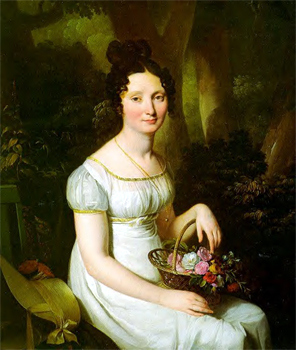 Pale Skin
Pale Skin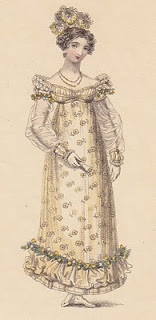
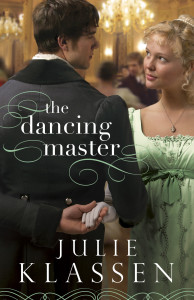
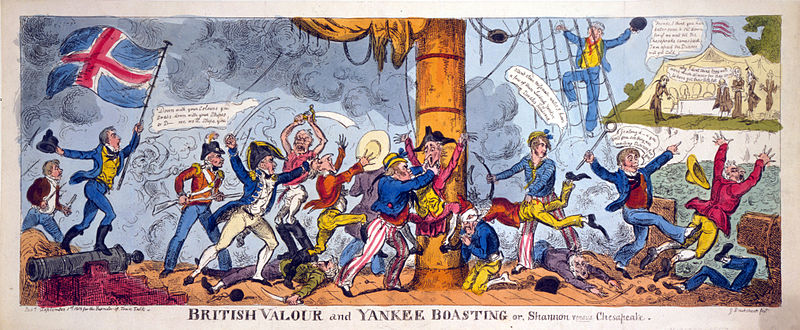
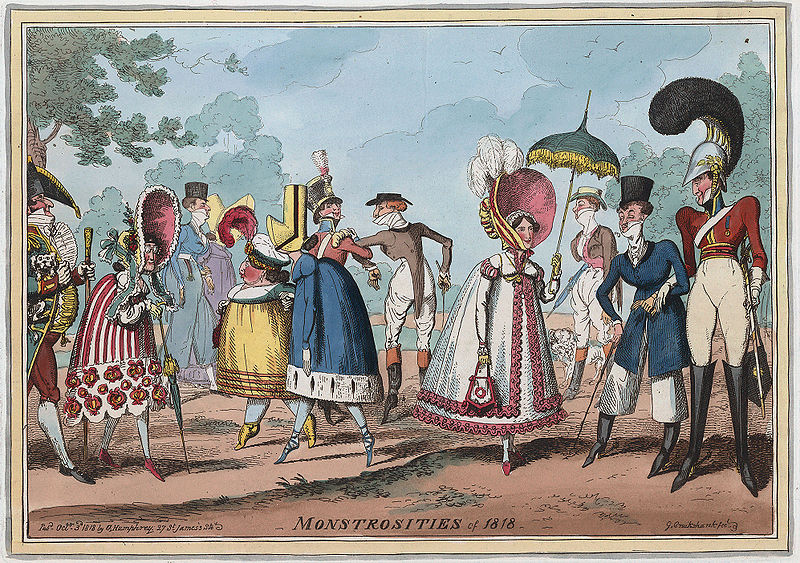
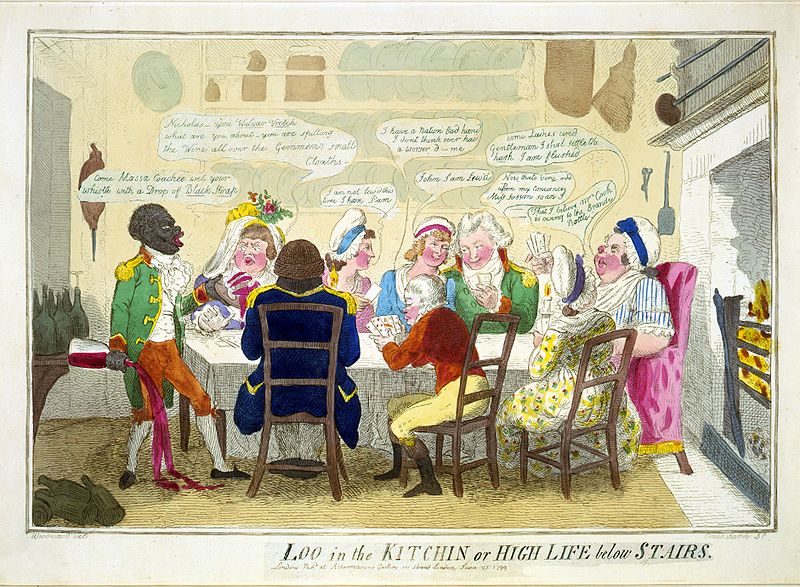
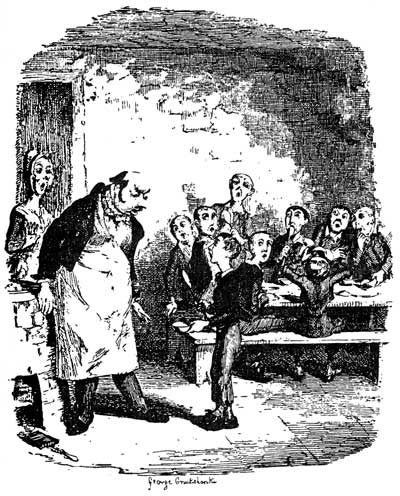
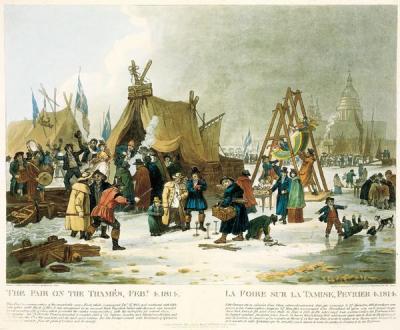 The ramifications of cold weather were l to the people of Regency England. 1816 is even famously known as the
The ramifications of cold weather were l to the people of Regency England. 1816 is even famously known as the 